Раздел "Устная часть" ЕГЭ 2024.
Варианты ЕГЭ по английскому языку
Варианты ЕГЭ по английскому языку
ВАРИАНТ 1
Task 1. Imagine that you are preparing a project with your friend. You have found some interesting material for the presentation and you want to read this text to your friend. You have 1.5 minutes to read the text silently, then be ready to read it out aloud. You will not have more than 1.5 minutes to read it.
Every ecological crisis is a tough lesson for the planet. Each situation shows how little people know about our world. Our environment faces several problems, such as pollution, global warming, overpopulation, ocean acidification, loss of species and waste disposal. Some people can understand these environmental problems. They do their best to reduce air and water pollution and to tackle climate change together. However, there are some "well-educated" people who cannot provide even a rough explanation of the greenhouse effect, the carbon cycle or the water cycle. But these issues about which most people live in ignorance are, by contrast, matters of life and death.
Every ecological crisis is a tough lesson for the planet. Each situation shows how little people know about our world. Our environment faces several problems, such as pollution, global warming, overpopulation, ocean acidification, loss of species and waste disposal. Some people can understand these environmental problems. They do their best to reduce air and water pollution and to tackle climate change together. However, there are some "well-educated" people who cannot provide even a rough explanation of the greenhouse effect, the carbon cycle or the water cycle. But these issues about which most people live in ignorance are, by contrast, matters of life and death.
Task 2. Study the advertisement.
You are considering staying at this environmentally friendly hotel and now you’d like to get more information. In 1.5 minutes you are to ask four direct questions to find out about the following:
1) location of the hotel
2) special offers
3) diversity of amenities
4) if they have education programs for youths
You have 20 seconds to ask each question.
You are considering staying at this environmentally friendly hotel and now you’d like to get more information. In 1.5 minutes you are to ask four direct questions to find out about the following:
1) location of the hotel
2) special offers
3) diversity of amenities
4) if they have education programs for youths
You have 20 seconds to ask each question.

Task 3. You are going to give an interview. You have to answer five questions. Give full answers to the questions (2–3 sentences). Remember that you have 40 seconds to answer each question.
Tapescript for Task 3
Interviewer: Hello everybody! It’s Teenagers Round the World Channel. Our guest today is a teenager from Russia and we are going to discuss ecology. We’d like to know our guest’s point of view on this issue. Please answer five questions. So, let’s get started.
Interviewer: What region of Russia do you live in? Is it an environmentally friendly place?
Student: _________________________
Interviewer: What are the biggest environmental problems that you face in the place where you live?
Student: _________________________
Interviewer: In what ways can we increase public awareness of our ecological footprints?
Student: _________________________
Interviewer: What are the main rules that people should follow to protect our nature?
Student: _________________________
Interviewer: Are you interested in tackling the ecological problems in your region? Why/Why not?
Student: _________________________
Interviewer: Thank you very much for your interview.
Interviewer: Hello everybody! It’s Teenagers Round the World Channel. Our guest today is a teenager from Russia and we are going to discuss ecology. We’d like to know our guest’s point of view on this issue. Please answer five questions. So, let’s get started.
Interviewer: What region of Russia do you live in? Is it an environmentally friendly place?
Student: _________________________
Interviewer: What are the biggest environmental problems that you face in the place where you live?
Student: _________________________
Interviewer: In what ways can we increase public awareness of our ecological footprints?
Student: _________________________
Interviewer: What are the main rules that people should follow to protect our nature?
Student: _________________________
Interviewer: Are you interested in tackling the ecological problems in your region? Why/Why not?
Student: _________________________
Interviewer: Thank you very much for your interview.
Task 4. Imagine that you and your friend are doing a school project “Valuable use of plastic products”. You have found some photos to illustrate it but for technical reasons you cannot send them now. Leave a voice message to your friend explaining your choice of the photos and sharing some ideas about the project. In 2.5 minutes be ready to:
• explain the choice of the illustrations for the project by briefly describing them and noting the differences;
• mention the advantages (1–2) of the 2 types of reusing plastic bottles;
• mention the disadvantages (1–2) of the 2 types of reusing plastic bottles;
• express your opinion on the subject of the project – whether you support single use plastic bottles or the idea of reusing them and why.
You will speak for not more than 3 minutes (12–15 sentences). You have to talk continuously.
• explain the choice of the illustrations for the project by briefly describing them and noting the differences;
• mention the advantages (1–2) of the 2 types of reusing plastic bottles;
• mention the disadvantages (1–2) of the 2 types of reusing plastic bottles;
• express your opinion on the subject of the project – whether you support single use plastic bottles or the idea of reusing them and why.
You will speak for not more than 3 minutes (12–15 sentences). You have to talk continuously.
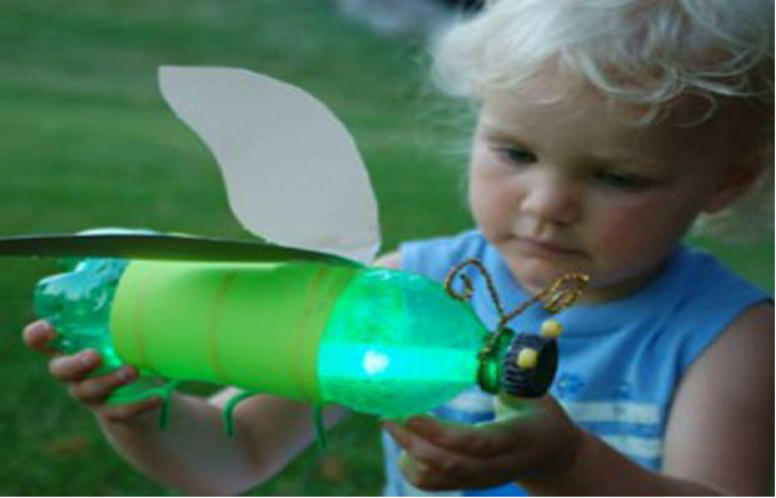
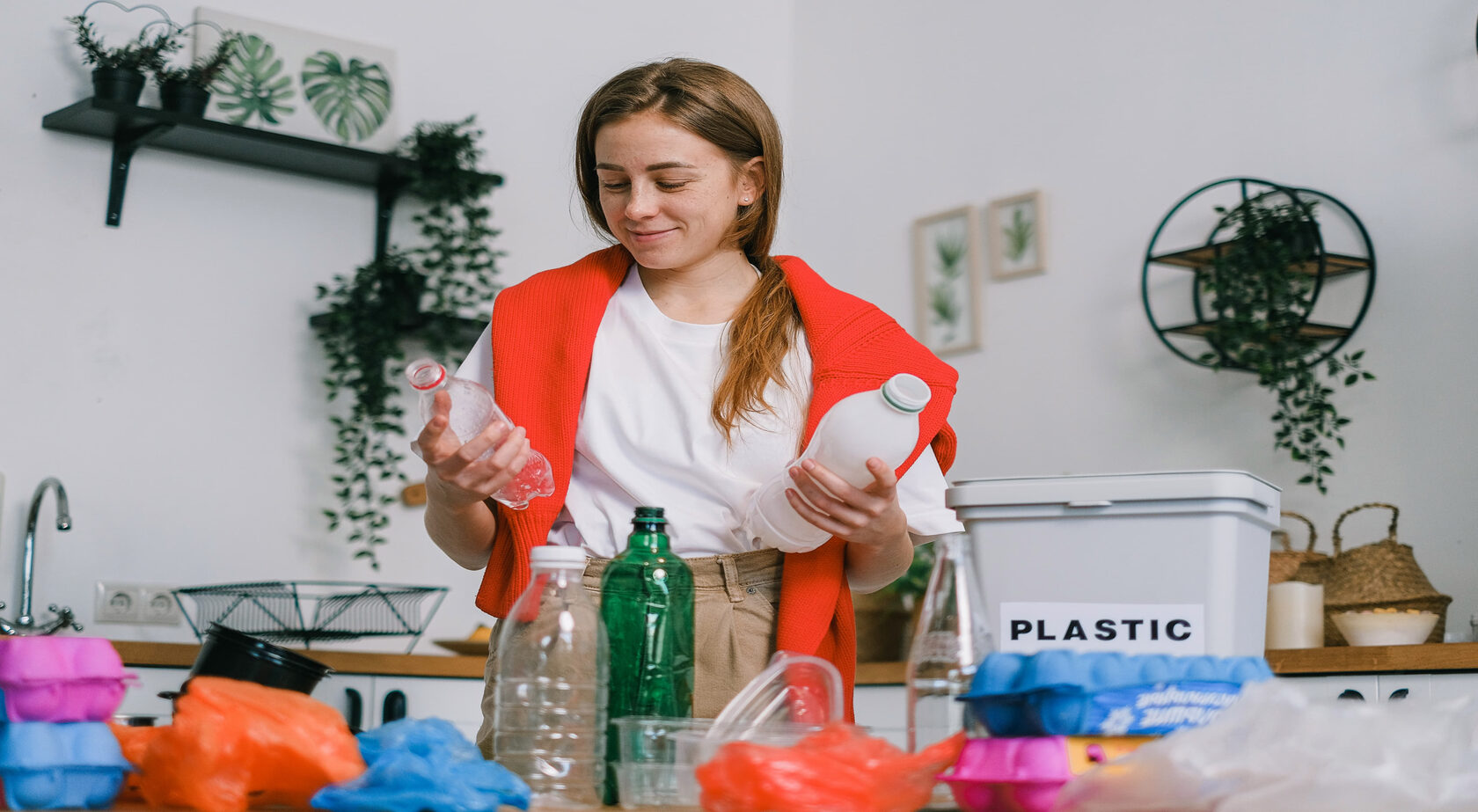
ВАРИАНТ 2
Task 1. Imagine that you are preparing a project with your friend. You have found some interesting material for the presentation and you want to read this text to your friend. You have 1.5 minutes to read the text silently, then be ready to read it out aloud. You will not have more than 1.5 minutes to read it.
Many scientists have been working on the projects proving alien life on Mars for years. Nowadays it seems far from the truth with the finding that the surface of the red planet contains a “toxic cocktail” of chemicals that can wipe out living organisms. Experiments with compounds found in the Martian soil show that they are turned into potent bactericides by the ultraviolet light that bathes the planet, effectively sterilising the upper layers of the dusty landscape.
It is difficult to measure, but according to some studies, the most hospitable environment may lie two or three metres beneath the surface where the soil and any organisms are shielded from intense radiation. “At those depths, it’s possible Martian life may survive,” said Jennifer Wadsworth, a postgraduate astrobiologist at Edinburgh University.
Many scientists have been working on the projects proving alien life on Mars for years. Nowadays it seems far from the truth with the finding that the surface of the red planet contains a “toxic cocktail” of chemicals that can wipe out living organisms. Experiments with compounds found in the Martian soil show that they are turned into potent bactericides by the ultraviolet light that bathes the planet, effectively sterilising the upper layers of the dusty landscape.
It is difficult to measure, but according to some studies, the most hospitable environment may lie two or three metres beneath the surface where the soil and any organisms are shielded from intense radiation. “At those depths, it’s possible Martian life may survive,” said Jennifer Wadsworth, a postgraduate astrobiologist at Edinburgh University.
Task 2. Study the advertisement.
You are considering making an appointment at the laboratory and now you’d like to get more information. In 1.5 minutes you are to ask four direct questions to find out about the following:
1) location of the nearest laboratory
2) if they have licenses and accreditations
3) diversity of laboratory tests
4) working hours
You have 20 seconds to ask each question.
You are considering making an appointment at the laboratory and now you’d like to get more information. In 1.5 minutes you are to ask four direct questions to find out about the following:
1) location of the nearest laboratory
2) if they have licenses and accreditations
3) diversity of laboratory tests
4) working hours
You have 20 seconds to ask each question.

Task 3. You are going to give an interview. You have to answer five questions. Give full answers to the questions (2–3 sentences). Remember that you have 40 seconds to answer each question.
Tapescript for Task 3
Interviewer: Hello everybody! It’s Teenagers Round the World Channel. Our guest today is a teenager from Russia and we are going to discuss scientific studies. We’d like to know our guest’s point of view on this issue. Please answer
five questions. So, let’s get started.
Interviewer: What region of Russia do you live in? Is it an attractive place for scientists?
Student: _________________________
Interviewer: What scientific organisations do you have in your region?
Student: _________________________
Interviewer: What is Science? Is it prestigious to be a scientist?
Student: _________________________
Interviewer: What scientific projects and experiments do Russian schoolchildren usually have at school?
Student: _________________________
Interviewer: Are scientific projects and experiments necessary at school? Why/Why not?
Student: _________________________
Interviewer: Thank you very much for your interview.
Interviewer: Hello everybody! It’s Teenagers Round the World Channel. Our guest today is a teenager from Russia and we are going to discuss scientific studies. We’d like to know our guest’s point of view on this issue. Please answer
five questions. So, let’s get started.
Interviewer: What region of Russia do you live in? Is it an attractive place for scientists?
Student: _________________________
Interviewer: What scientific organisations do you have in your region?
Student: _________________________
Interviewer: What is Science? Is it prestigious to be a scientist?
Student: _________________________
Interviewer: What scientific projects and experiments do Russian schoolchildren usually have at school?
Student: _________________________
Interviewer: Are scientific projects and experiments necessary at school? Why/Why not?
Student: _________________________
Interviewer: Thank you very much for your interview.
Task 4. Imagine that you and your friend are doing a school project “Science and Daily life”. You have found some photos to illustrate it but for technical reasons you cannot send them now. Leave a voice message to your friend explaining your choice of the photos and sharing some ideas about the project. In 2.5 minutes be ready to:
• explain the choice of the illustrations for the project by briefly describing them and noting the differences;
• mention the advantages (1–2) of the two scientific examples;
• mention the disadvantages (1–2) of the two scientific examples;
• express your opinion on the subject of the project – how applied science affects our daily lives.
You will speak for not more than 3 minutes (12–15 sentences). You have to talk continuously.
• explain the choice of the illustrations for the project by briefly describing them and noting the differences;
• mention the advantages (1–2) of the two scientific examples;
• mention the disadvantages (1–2) of the two scientific examples;
• express your opinion on the subject of the project – how applied science affects our daily lives.
You will speak for not more than 3 minutes (12–15 sentences). You have to talk continuously.


ВАРИАНТ 3
Task 1. Imagine that you are preparing a project with your friend. You have found some interesting material for the presentation and you want to read this text to your friend. You have 1.5 minutes to read the text silently, then be ready to read it out aloud. You will not have more than 1.5 minutes to read it.
Most parents believe that lack of household tasks make children less responsible. Some surveys support this idea. In earlier generations, children and adolescents were given more household chores that were considered as an important part of their lifestyle. They nursed sick family members, helped to maintain the family car or prepared meals for the whole family. All these activities helped children develop empathy and a desire to contribute to the well-being of others.
In contrast, the only responsibility given to modern teenagers is schoolwork. It’s a nightmare for children to wash the dishes or to mop the floor. In rare cases teenagers are ready to walk the dog or to lay the table, but for toys, games or outings. Amelia Hill, social affairs correspondent, is sure that modern parents who don't give their children chores at home may be slowing their development. Some psychologists and scientists agree with this opinion.
Most parents believe that lack of household tasks make children less responsible. Some surveys support this idea. In earlier generations, children and adolescents were given more household chores that were considered as an important part of their lifestyle. They nursed sick family members, helped to maintain the family car or prepared meals for the whole family. All these activities helped children develop empathy and a desire to contribute to the well-being of others.
In contrast, the only responsibility given to modern teenagers is schoolwork. It’s a nightmare for children to wash the dishes or to mop the floor. In rare cases teenagers are ready to walk the dog or to lay the table, but for toys, games or outings. Amelia Hill, social affairs correspondent, is sure that modern parents who don't give their children chores at home may be slowing their development. Some psychologists and scientists agree with this opinion.
Task 2. Study the advertisement.
You are considering staying at the work camp and now you’d like to get more information. In 1.5 minutes you are to ask four direct questions to find out about the following:
1. location of the work camp
2. number of people
3. seasonal offers
4. if food and accommodation are included
You have 20 seconds to ask each question.
You are considering staying at the work camp and now you’d like to get more information. In 1.5 minutes you are to ask four direct questions to find out about the following:
1. location of the work camp
2. number of people
3. seasonal offers
4. if food and accommodation are included
You have 20 seconds to ask each question.

Task 3. You are going to give an interview. You have to answer five questions. Give full answers to the questions (2–3 sentences). Remember that you have 40 seconds to answer each question.
Tapescript for Task 3
Interviewer: Hello everybody! It’s Teenagers Round the World Channel. Our guest today is a teenager from Russia and we are going to discuss household chores. We’d like to know our guest’s point of view on this issue. Please answer five questions. So, let’s get started.
Interviewer: What region of Russia do you live in? Is it a rural area or a city?
Student: _________________________
Interviewer: What household chores do teenagers have in your region?
Student: _________________________
Interviewer: Are there any differences between household chores in the country and in an urban area?
Student: _________________________
Interviewer: What household tasks do you find easy? What are the most difficult chores in your opinion?
Student: _________________________
Interviewer: Is it useful for teenagers to do household chores? Why/why not?
Student: _________________________
Interviewer: Thank you very much for your interview.
Interviewer: Hello everybody! It’s Teenagers Round the World Channel. Our guest today is a teenager from Russia and we are going to discuss household chores. We’d like to know our guest’s point of view on this issue. Please answer five questions. So, let’s get started.
Interviewer: What region of Russia do you live in? Is it a rural area or a city?
Student: _________________________
Interviewer: What household chores do teenagers have in your region?
Student: _________________________
Interviewer: Are there any differences between household chores in the country and in an urban area?
Student: _________________________
Interviewer: What household tasks do you find easy? What are the most difficult chores in your opinion?
Student: _________________________
Interviewer: Is it useful for teenagers to do household chores? Why/why not?
Student: _________________________
Interviewer: Thank you very much for your interview.
Task 4. Imagine that you and your friend are doing a school project “Household chores in the country and in a city”. You have found some photos to illustrate it but for technical reasons you cannot send them now. Leave a voice message to your friend explaining your choice of the photos and sharing some ideas about the project. In 2.5 minutes be ready to:
You will speak for not more than 3 minutes (12–15 sentences). You have to talk continuously.
- explain the choice of the illustrations for the project by briefly describing them and noting the differences;
- mention the advantages (1–2) of the two types of household chores;
- mention the disadvantages (1–2) of the two types of household chores;
- express your opinion on the subject of the project – which type of household chores you prefer and why.
You will speak for not more than 3 minutes (12–15 sentences). You have to talk continuously.


ВАРИАНТ 4
Task 1. Imagine that you are preparing a project with your friend. You have found some interesting material for the presentation and you want to read this text to your friend. You have 1.5 minutes to read the text silently, then be ready to read it out aloud. You will not have more than 1.5 minutes to read it.
Nowadays people can choose between online and offline shopping. As a rule, people prefer going online for gifts (70.9%), books (5%) and holidays (23%), while they go offline to find shopping cheer and emotions in local stalls and shops.
In 2020 people spent hours scouring retail websites while a lot of shops in the world stood empty. At present a lot of adults are sick of online retail: endless lists of goods, the missed deliveries and hours wasted queuing at the delivery office. And sometimes parents get angry to face surprise bills for virtual items that their children bought. Parents are looking for a way to stop their children making inn-app purchases on Android. They also understand that buying in local shops means that you are investing in your community. Teenagers disagree with their parents. They shop online because it’s cheaper, easier and quicker.
Nowadays people can choose between online and offline shopping. As a rule, people prefer going online for gifts (70.9%), books (5%) and holidays (23%), while they go offline to find shopping cheer and emotions in local stalls and shops.
In 2020 people spent hours scouring retail websites while a lot of shops in the world stood empty. At present a lot of adults are sick of online retail: endless lists of goods, the missed deliveries and hours wasted queuing at the delivery office. And sometimes parents get angry to face surprise bills for virtual items that their children bought. Parents are looking for a way to stop their children making inn-app purchases on Android. They also understand that buying in local shops means that you are investing in your community. Teenagers disagree with their parents. They shop online because it’s cheaper, easier and quicker.
Task 2. Study the advertisement.
You are thinking about visiting the store and now you’d like to get more information. In 1.5 minutes you are to ask four direct questions to find out about the following:
1. location
2. size of the shop
3. working hours
4. availability of discount cards
You have 20 seconds to ask each question.
You are thinking about visiting the store and now you’d like to get more information. In 1.5 minutes you are to ask four direct questions to find out about the following:
1. location
2. size of the shop
3. working hours
4. availability of discount cards
You have 20 seconds to ask each question.

Task 3. You are going to give an interview. You have to answer five questions. Give full answers to the questions (2–3 sentences). Remember that you have 40 seconds to answer each question.
Tapescript for Task 3
Interviewer: Hello everybody! It’s Teenagers Round the World Channel. Our guest today is a teenager from Russia and we are going to discuss online and offline shopping. We’d like to know our guest’s point of view on this issue. Please answer five questions. So, let’s get started.
Interviewer: What region of Russia do you live in? Is it a rural area or a city?
Student: _________________________
Interviewer: Where do people buy goods in your village, town or city? What are the most popular places?
Student: _________________________
Interviewer: What sites do people use to shop online? Why are they so popular?
Student: _________________________
Interviewer: What risks can you face shopping online?
Student: _________________________
Interviewer: What way of shopping do you prefer: online or offline? Why?
Student: _________________________
Interviewer: Thank you very much for your interview.
Interviewer: Hello everybody! It’s Teenagers Round the World Channel. Our guest today is a teenager from Russia and we are going to discuss online and offline shopping. We’d like to know our guest’s point of view on this issue. Please answer five questions. So, let’s get started.
Interviewer: What region of Russia do you live in? Is it a rural area or a city?
Student: _________________________
Interviewer: Where do people buy goods in your village, town or city? What are the most popular places?
Student: _________________________
Interviewer: What sites do people use to shop online? Why are they so popular?
Student: _________________________
Interviewer: What risks can you face shopping online?
Student: _________________________
Interviewer: What way of shopping do you prefer: online or offline? Why?
Student: _________________________
Interviewer: Thank you very much for your interview.


Task 4. Imagine that you and your friend are doing a school project “Online and offline shopping”. You have found some photos to illustrate it but for technical reasons you cannot send them now. Leave a voice message to your friend explaining your choice of the photos and sharing some ideas about the project. In 2.5 minutes be ready to:
• explain the choice of the illustrations for the project by briefly describing them and noting the differences;
• mention the advantages (1–2) of the two types of shopping;
• mention the disadvantages (1–2) of the two types of shopping;
• express your opinion on the subject of the project – which type of shopping you prefer and why.
You will speak for not more than 3 minutes (12–15 sentences). You have to talk continuously.
• explain the choice of the illustrations for the project by briefly describing them and noting the differences;
• mention the advantages (1–2) of the two types of shopping;
• mention the disadvantages (1–2) of the two types of shopping;
• express your opinion on the subject of the project – which type of shopping you prefer and why.
You will speak for not more than 3 minutes (12–15 sentences). You have to talk continuously.


ВАРИАНТ 5
Task 1. Imagine that you are preparing a project with your friend. You have found some interesting material for the presentation and you want to read this text to your friend. You have 1.5 minutes to read the text silently, then be ready to read it out aloud. You will not have more than 1.5 minutes to read it.
Many parents and children feel upset because they do not interact as a family. Some parents are sure that giving their children mobile phones ends their relationship. It means fewer dinners together, less non-phone related activities to participate in and lack of in-person conversations. Parents can’t have any possible eye contact with their children as the teenagers’ eyes go back to the screens after one word or phrase. As a result, parents try to maintain strict control over the apps their children use.
However, there are families that stay connected with each other. They haven’t lost the art of conversation. They have the ability to be present. These people are sure that good relationship requires love, understanding, shared meals, respect and phone-free times. They are ready to improvise.
Many parents and children feel upset because they do not interact as a family. Some parents are sure that giving their children mobile phones ends their relationship. It means fewer dinners together, less non-phone related activities to participate in and lack of in-person conversations. Parents can’t have any possible eye contact with their children as the teenagers’ eyes go back to the screens after one word or phrase. As a result, parents try to maintain strict control over the apps their children use.
However, there are families that stay connected with each other. They haven’t lost the art of conversation. They have the ability to be present. These people are sure that good relationship requires love, understanding, shared meals, respect and phone-free times. They are ready to improvise.
Task 2. Study the advertisement.
You are thinking about visiting the Family centre and now you’d like to get more information. In 1.5 minutes you are to ask four direct questions to find out about the following:
1.location
2. diversity of services
3. if they provide early education and integrated childcare
4.specialists
You have 20 seconds to ask each question.
You are thinking about visiting the Family centre and now you’d like to get more information. In 1.5 minutes you are to ask four direct questions to find out about the following:
1.location
2. diversity of services
3. if they provide early education and integrated childcare
4.specialists
You have 20 seconds to ask each question.

Task 3. You are going to give an interview. You have to answer five questions. Give full answers to the questions (2–3 sentences). Remember that you have 40 seconds to answer each question.
Tapescript for Task 3
Interviewer: Hello everybody! It’s Teenagers Round the World Channel. Our guest today is a teenager from Russia and we are going to discuss family centres. We’d like to know our guest’s point of view on this issue. Please answer five questions. So, let’s get started.
Interviewer: What region of Russia do you live in? Are there any family centres there?
Student: _________________________
Interviewer: How do teenagers communicate with their parents?
Student: _________________________
Interviewer: What problems can teenagers and parents face while interacting as a family?
Student: _________________________
Interviewer: What advantages can people have when they are connected with each other?
Student: _________________________
Interviewer: What traditions do you have in your family? Are they important to you? Why?
Student: _________________________
Interviewer: Thank you very much for your interview.
Interviewer: Hello everybody! It’s Teenagers Round the World Channel. Our guest today is a teenager from Russia and we are going to discuss family centres. We’d like to know our guest’s point of view on this issue. Please answer five questions. So, let’s get started.
Interviewer: What region of Russia do you live in? Are there any family centres there?
Student: _________________________
Interviewer: How do teenagers communicate with their parents?
Student: _________________________
Interviewer: What problems can teenagers and parents face while interacting as a family?
Student: _________________________
Interviewer: What advantages can people have when they are connected with each other?
Student: _________________________
Interviewer: What traditions do you have in your family? Are they important to you? Why?
Student: _________________________
Interviewer: Thank you very much for your interview.
Task 4.Imagine that you and your friend are doing a school project “Two ways of communication in a family”. You have found some photos to illustrate it but for technical reasons you cannot send them now. Leave a voice message to your friend explaining your choice of the photos and sharing some ideas about the project. In 2.5 minutes be ready to:
• explain the choice of the illustrations for the project by briefly describing them and noting the differences;
• mention the advantages (1–2) of the two types of communication in a family;
• mention the disadvantages (1–2) of the two types of communication in a family;
• express your opinion on the subject of the project – which type is better and why.
You will speak for not more than 3 minutes (12–15 sentences). You have to talk continuously.
• explain the choice of the illustrations for the project by briefly describing them and noting the differences;
• mention the advantages (1–2) of the two types of communication in a family;
• mention the disadvantages (1–2) of the two types of communication in a family;
• express your opinion on the subject of the project – which type is better and why.
You will speak for not more than 3 minutes (12–15 sentences). You have to talk continuously.


ВАРИАНТ 6
Task 1. Imagine that you are preparing a project with your friend. You have found some interesting material for the presentation and you want to read this text to your friend. You have 1.5 minutes to read the text silently, then be ready to read it out aloud. You will not have more than 1.5 minutes to read it.
There are always arguments about communication skills that students show at school. As a rule, students communicate with teachers and classmates in pairs or small groups. Undoubtedly, there are students with different linguistic backgrounds and various levels of communicative competence. They can communicate with others at their particular level of proficiency.
Nowadays more and more students are using new ways of communicating to stay connected with their classmates and teachers. In these cases psychologists underline the importance of developing online communication skills. Texting, making videos and video conferencing show the necessity of building digital communication skills.
There are always arguments about communication skills that students show at school. As a rule, students communicate with teachers and classmates in pairs or small groups. Undoubtedly, there are students with different linguistic backgrounds and various levels of communicative competence. They can communicate with others at their particular level of proficiency.
Nowadays more and more students are using new ways of communicating to stay connected with their classmates and teachers. In these cases psychologists underline the importance of developing online communication skills. Texting, making videos and video conferencing show the necessity of building digital communication skills.
Task 2. Study the advertisement.
You are thinking about visiting the Communication centre at school and now you’d like to get more information. In 1.5 minutes you are to ask four direct questions to find out about the following:
1. location
2. problems they solve
3. required papers
4. programs they provide
You have 20 seconds to ask each question.
You are thinking about visiting the Communication centre at school and now you’d like to get more information. In 1.5 minutes you are to ask four direct questions to find out about the following:
1. location
2. problems they solve
3. required papers
4. programs they provide
You have 20 seconds to ask each question.
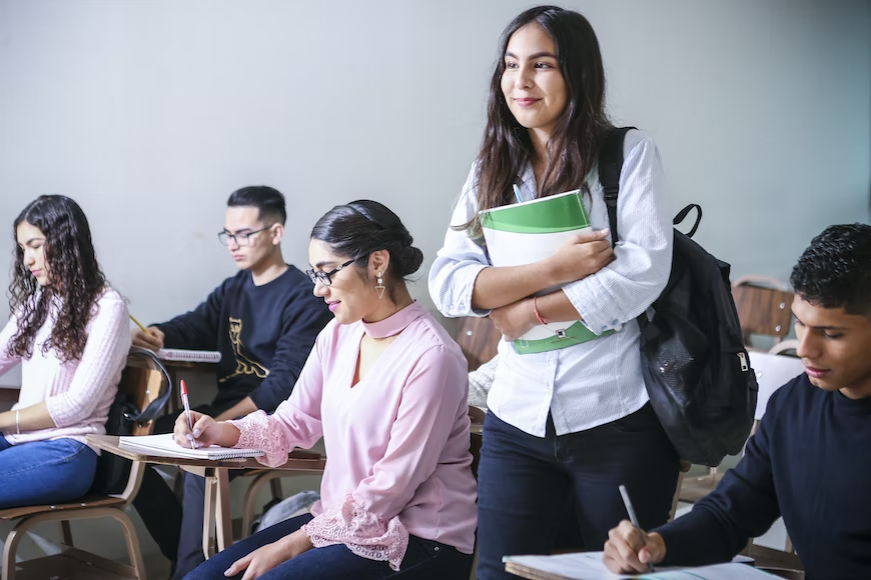
Task 3. You are going to give an interview. You have to answer five questions. Give full answers to the questions (2–3 sentences). Remember that you have 40 seconds to answer each question.
Tapescript for Task 3
Interviewer: Hello everybody! It’s Teenagers Round the World Channel. Our guest today is a teenager from Russia and we are going to discuss communication problems. We’d like to know our guest’s point of view on this issue. Please answer five questions. So, let’s get started.
Interviewer: What ways of communication do you know?
Student: _________________________
Interviewer: What communication problems do teenagers usually face interacting at school?
Student: _________________________
Interviewer: What specialists can help teenagers to be connected with their classmates and teachers?
Student: _________________________
Interviewer: Is a phone at school a tool or a distraction? Why?
Student: _________________________
Interviewer: What way of communication do you prefer: online or offline? Why?
Student: _________________________
Interviewer: Thank you very much for your interview.
Interviewer: Hello everybody! It’s Teenagers Round the World Channel. Our guest today is a teenager from Russia and we are going to discuss communication problems. We’d like to know our guest’s point of view on this issue. Please answer five questions. So, let’s get started.
Interviewer: What ways of communication do you know?
Student: _________________________
Interviewer: What communication problems do teenagers usually face interacting at school?
Student: _________________________
Interviewer: What specialists can help teenagers to be connected with their classmates and teachers?
Student: _________________________
Interviewer: Is a phone at school a tool or a distraction? Why?
Student: _________________________
Interviewer: What way of communication do you prefer: online or offline? Why?
Student: _________________________
Interviewer: Thank you very much for your interview.
Task 4. Imagine that you and your friend are doing a school project “School websites and non-digital communication”. You have found some photos to illustrate it but for technical reasons you cannot send them now. Leave a voice message to your friend explaining your choice of the photos and sharing some ideas about the project. In 2.5 minutes be ready to:
• explain the choice of the illustrations for the project by briefly describing them and noting the differences;
• mention the advantages (1–2) of the two types of communication;
• mention the disadvantages (1–2) of the two types of communication;
• express your opinion on the subject of the project – which type of communication you prefer and why.
You will speak for not more than 3 minutes (12–15 sentences). You have to talk continuously.
• explain the choice of the illustrations for the project by briefly describing them and noting the differences;
• mention the advantages (1–2) of the two types of communication;
• mention the disadvantages (1–2) of the two types of communication;
• express your opinion on the subject of the project – which type of communication you prefer and why.
You will speak for not more than 3 minutes (12–15 sentences). You have to talk continuously.


ВАРИАНТ 7
Task 1. Imagine that you are preparing a project with your friend. You have found some interesting material for the presentation and you want to read this text to your friend. You have 1.5 minutes to read the text silently, then be ready to read it out aloud. You will not have more than 1.5 minutes to read it.
For some people it’s a hard decision to make family traditions as identifying what brings you together needs time, love and attention. Others find it difficult to maintain festive traditions. Undoubtedly, family traditions are worth embracing as they unite people and help them be a real family.
As a rule, Russian people have a lot of traditions around holidays. Every December they get together to enjoy all-you-can-eat dishes and exchange gifts. They make efforts to celebrate birthdays in a low-effort but high-reward way. They don’t forget about religious holidays, for example, Easter.
Young family members enjoy Friday night takeaway or watching movies at home. Sharing dinner with parents is the most valuable family tradition for most families in the situation when people are short on both time and money. Parents usually plan annual overseas trips with their children.
For some people it’s a hard decision to make family traditions as identifying what brings you together needs time, love and attention. Others find it difficult to maintain festive traditions. Undoubtedly, family traditions are worth embracing as they unite people and help them be a real family.
As a rule, Russian people have a lot of traditions around holidays. Every December they get together to enjoy all-you-can-eat dishes and exchange gifts. They make efforts to celebrate birthdays in a low-effort but high-reward way. They don’t forget about religious holidays, for example, Easter.
Young family members enjoy Friday night takeaway or watching movies at home. Sharing dinner with parents is the most valuable family tradition for most families in the situation when people are short on both time and money. Parents usually plan annual overseas trips with their children.
Task 2. Study the advertisement.
You are thinking about visiting the Family friendly hotel in Moscow and now you’d like to get more information. In 1.5 minutes you are to ask four direct questions to find out about the following:
3. if it’s necessary to register your plate number before driving to the hotel_
4. hotel facilities for families
You have 20 seconds to ask each question.
You are thinking about visiting the Family friendly hotel in Moscow and now you’d like to get more information. In 1.5 minutes you are to ask four direct questions to find out about the following:
- location
3. if it’s necessary to register your plate number before driving to the hotel_
4. hotel facilities for families
You have 20 seconds to ask each question.

Task 3. You are going to give an interview. You have to answer five questions. Give full answers to the questions (2–3 sentences). Remember that you have 40 seconds to answer each question.
Tapescript for Task 3
Interviewer: Hello everybody! It’s Teenagers Round the World Channel. Our guest today is a teenager from Russia and we are going to discuss family traditions. We’d like to know our guest’s point of view on this issue. Please answer five questions. So, let’s get started.
Interviewer: What family traditions are popular in the region where you live?
Student: _________________________
Interviewer: What indoor and outdoor traditions can a family have?
Student: _________________________
Interviewer: Are family traditions necessary for every family? Why/Why not?
Student: _________________________
Interviewer: What is better - to follow the traditions your family has or to create new ones?
Student: _________________________
Interviewer: What family tradition do you prefer? Why?
Student: _________________________
Interviewer: Thank you very much for your interview.
Interviewer: Hello everybody! It’s Teenagers Round the World Channel. Our guest today is a teenager from Russia and we are going to discuss family traditions. We’d like to know our guest’s point of view on this issue. Please answer five questions. So, let’s get started.
Interviewer: What family traditions are popular in the region where you live?
Student: _________________________
Interviewer: What indoor and outdoor traditions can a family have?
Student: _________________________
Interviewer: Are family traditions necessary for every family? Why/Why not?
Student: _________________________
Interviewer: What is better - to follow the traditions your family has or to create new ones?
Student: _________________________
Interviewer: What family tradition do you prefer? Why?
Student: _________________________
Interviewer: Thank you very much for your interview.
Task 4. Imagine that you and your friend are doing a school project “Indoor and outdoor family traditions”. You have found some photos to illustrate it but for technical reasons you cannot send them now. Leave a voice message to your friend explaining your choice of the photos and sharing some ideas about the project. In 2.5 minutes be ready to:
• explain the choice of the illustrations for the project by briefly describing them and noting the differences;
• mention the advantages (1–2) of the two types of traditions;
• mention the disadvantages (1–2) of the two types of traditions;
• express your opinion on the subject of the project – which type of traditions you prefer and why.
You will speak for not more than 3 minutes (12–15 sentences). You have to talk continuously.
• explain the choice of the illustrations for the project by briefly describing them and noting the differences;
• mention the advantages (1–2) of the two types of traditions;
• mention the disadvantages (1–2) of the two types of traditions;
• express your opinion on the subject of the project – which type of traditions you prefer and why.
You will speak for not more than 3 minutes (12–15 sentences). You have to talk continuously.


ВАРИАНТ 8
Task 1. Imagine that you are preparing a project with your friend. You have found some interesting material for the presentation and you want to read this text to your friend. You have 1.5 minutes to read the text silently, then be ready to read it out aloud. You will not have more than 1.5 minutes to read it.
Nowadays patriotism is a brand word. It is popular and respectful to be patriots. A lot of initiatives exist around the world, forming an integral part of the patriotic education, regulated by different governments through significant programmes of financial support.
According to the Cambridge dictionary, a patriot is ‘a person who loves their country and, if necessary, will fight for it’. And each country has its interpretation of the word and practical realization of its patriotic movements.
Some nations encourage young citizens to feel a responsibility for their country on the basis of values of love, kindness, labour, friendship and honesty. Other countries increase the budget for the military education, where children and adults spend their time learning to fight and handle weapons. In any way, people should know the differences between patriotism and nationalism.
Nowadays patriotism is a brand word. It is popular and respectful to be patriots. A lot of initiatives exist around the world, forming an integral part of the patriotic education, regulated by different governments through significant programmes of financial support.
According to the Cambridge dictionary, a patriot is ‘a person who loves their country and, if necessary, will fight for it’. And each country has its interpretation of the word and practical realization of its patriotic movements.
Some nations encourage young citizens to feel a responsibility for their country on the basis of values of love, kindness, labour, friendship and honesty. Other countries increase the budget for the military education, where children and adults spend their time learning to fight and handle weapons. In any way, people should know the differences between patriotism and nationalism.
Task 2. Study the advertisement.
You are considering staying staying at the summer patriotic camp for teenagers and now you’d like to get more information. In 1.5 minutes you are to ask four direct questions to find out about the following:
1) location
2) accommodation
3) diversity of patriotic programmes
4) if they offer free wi-fi service
You have 20 seconds to ask each question.
You are considering staying staying at the summer patriotic camp for teenagers and now you’d like to get more information. In 1.5 minutes you are to ask four direct questions to find out about the following:
1) location
2) accommodation
3) diversity of patriotic programmes
4) if they offer free wi-fi service
You have 20 seconds to ask each question.
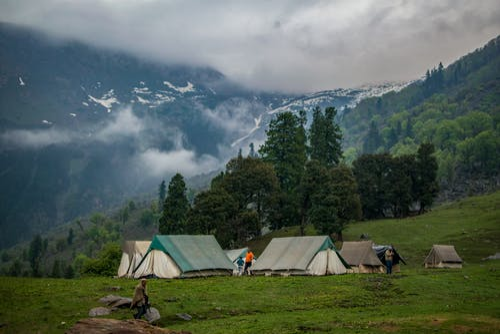
Task 3. You are going to give an interview. You have to answer five questions. Give full answers to the questions (2–3 sentences). Remember that you have 40 seconds to answer each question.
Tapescript for Task 3
Interviewer: Hello everybody! It’s Teenagers Round the World Channel. Our guest today is a teenager from Russia and we are going to discuss patriotism and nationalism. We’d like to know our guest’s point of view on this issue. Please answer five questions. So, let’s get started.
Interviewer: What region of Russia do you live in? Is it a patriotic place?
Student: _________________________
Interviewer: What patriotic places do you have in your region?
Student: _________________________
Interviewer: How do you understand the word ‘patriotism’?
Student: _________________________
Interviewer: How can people protect the world from aggressive forms of nationalism?
Student: _________________________
Interviewer: Is patriotic education necessary at school? Why/Why not?
Student: _________________________
Interviewer: Thank you very much for your interview.
Interviewer: Hello everybody! It’s Teenagers Round the World Channel. Our guest today is a teenager from Russia and we are going to discuss patriotism and nationalism. We’d like to know our guest’s point of view on this issue. Please answer five questions. So, let’s get started.
Interviewer: What region of Russia do you live in? Is it a patriotic place?
Student: _________________________
Interviewer: What patriotic places do you have in your region?
Student: _________________________
Interviewer: How do you understand the word ‘patriotism’?
Student: _________________________
Interviewer: How can people protect the world from aggressive forms of nationalism?
Student: _________________________
Interviewer: Is patriotic education necessary at school? Why/Why not?
Student: _________________________
Interviewer: Thank you very much for your interview.
Task 4. Imagine that you and your friend are doing a school project “Patriotism and nationalism”. You have found some photos to illustrate it but for technical reasons you cannot send them now. Leave a voice message to your friend explaining your choice of the photos and sharing some ideas about the project. In 2.5 minutes be ready to:
• explain the choice of the illustrations for the project by briefly describing them and noting the differences;
• mention the advantages (1–2) of the two types of developing any nation;
• mention the disadvantages (1–2) of the two types of developing any nation;
• Express your opinion on the subject of the project – how you understand the patriotic education in Russia.
You will speak for not more than 3 minutes (12–15 sentences). You have to talk continuously.
• explain the choice of the illustrations for the project by briefly describing them and noting the differences;
• mention the advantages (1–2) of the two types of developing any nation;
• mention the disadvantages (1–2) of the two types of developing any nation;
• Express your opinion on the subject of the project – how you understand the patriotic education in Russia.
You will speak for not more than 3 minutes (12–15 sentences). You have to talk continuously.


ВАРИАНТ 9
Task 1. Imagine that you are preparing a project with your friend. You have found some interesting material for the presentation and you want to read this text to your friend. You have 1.5 minutes to read the text silently, then be ready to read it out aloud. You will not have more than 1.5 minutes to read it.
Nowadays it isn’t challenging to find pros and cons of both living in the country and in a city. It’s more difficult to find the balance for those who want to combine two variants. Lockdowns have made many realize that this trend needs to accelerate.
The inevitable air and water pollution and a lot of noise in a city push people to relocate to the country. Local food growing and leisure attract more people. But they have to sacrifice higher wages or have to waste hours commuting by car.
At the same time in urban areas there’s everything people need for day-to-day life, such as housing, healthcare and sports facilities, metro and bus connections, supermarkets and even green space. If you have unusual hobbies, you will easily find a welcoming environment in a city. But you worry a lot more about your income in a city where the life is more expensive than in the country. Your entire world is on your doorstep. It’s a plus but it sometimes may irritate you because of a faster pace of life and crowds of people.
Nowadays it isn’t challenging to find pros and cons of both living in the country and in a city. It’s more difficult to find the balance for those who want to combine two variants. Lockdowns have made many realize that this trend needs to accelerate.
The inevitable air and water pollution and a lot of noise in a city push people to relocate to the country. Local food growing and leisure attract more people. But they have to sacrifice higher wages or have to waste hours commuting by car.
At the same time in urban areas there’s everything people need for day-to-day life, such as housing, healthcare and sports facilities, metro and bus connections, supermarkets and even green space. If you have unusual hobbies, you will easily find a welcoming environment in a city. But you worry a lot more about your income in a city where the life is more expensive than in the country. Your entire world is on your doorstep. It’s a plus but it sometimes may irritate you because of a faster pace of life and crowds of people.
Task 2. Study the advertisement.
You are considering working in the Childcare Centre in the Rural Community and now you’d like to get more information. In 1.5 minutes you are to ask four direct questions to find out about the following:
1. experience
2. responsibilities
3. required papers
4. rates of early childhood educators
You have 20 seconds to ask each question.
You are considering working in the Childcare Centre in the Rural Community and now you’d like to get more information. In 1.5 minutes you are to ask four direct questions to find out about the following:
1. experience
2. responsibilities
3. required papers
4. rates of early childhood educators
You have 20 seconds to ask each question.
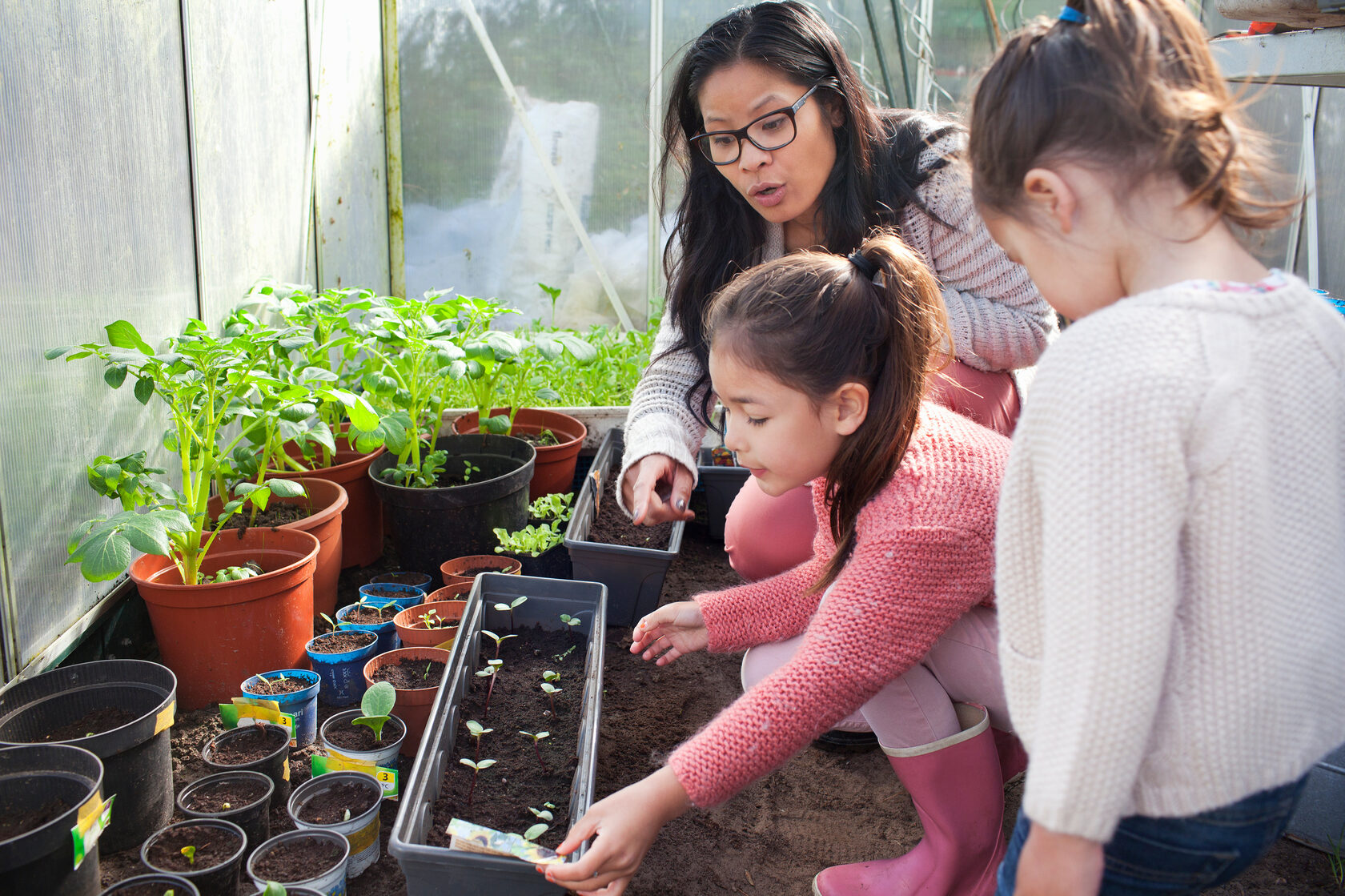
Task 3. You are going to give an interview. You have to answer five questions. Give full answers to the questions (2–3 sentences). Remember that you have 40 seconds to answer each question.
Tapescript for Task 3
Interviewer: Hello everybody! It’s Teenagers Round the World Channel. Our guest today is a teenager from Russia and we are going to discuss urban living and living in the country. We’d like to know our guest’s point of view on this issue. Please answer five questions. So, let’s get started.
Interviewer: What region of Russia do you live in? Is it an urban area or a rural one?
Student: _________________________
Interviewer: What are the merits of an urban lifestyle and a rural retreat?
Student: _________________________
Interviewer: What are the disadvantages of living in a city and living in the country?
Student: _________________________
Interviewer: What is the best environment to bring up children - a city or a village? Why?
Student: _________________________
Interviewer: Where would you like to live - in an urban area or a rural one? Why?
Student: _________________________
Interviewer: Thank you very much for your interview.
Interviewer: Hello everybody! It’s Teenagers Round the World Channel. Our guest today is a teenager from Russia and we are going to discuss urban living and living in the country. We’d like to know our guest’s point of view on this issue. Please answer five questions. So, let’s get started.
Interviewer: What region of Russia do you live in? Is it an urban area or a rural one?
Student: _________________________
Interviewer: What are the merits of an urban lifestyle and a rural retreat?
Student: _________________________
Interviewer: What are the disadvantages of living in a city and living in the country?
Student: _________________________
Interviewer: What is the best environment to bring up children - a city or a village? Why?
Student: _________________________
Interviewer: Where would you like to live - in an urban area or a rural one? Why?
Student: _________________________
Interviewer: Thank you very much for your interview.
Task 4. Imagine that you and your friend are doing a school project “City versus country childhoods». You have found some photos to illustrate it but for technical reasons you cannot send them now. Leave a voice message to your friend explaining your choice of the photos and sharing some ideas about the project. In 2.5 minutes be ready to:
• explain the choice of the illustrations for the project by briefly describing them and noting the differences;
• mention the advantages (1–2) of the two types of childhood;
• mention the disadvantages (1–2) of the two types of childhood;
• express your opinion on the subject of the project – which type of childhood you prefer and why.
You will speak for not more than 3 minutes (12–15 sentences). You have to talk continuously.
• explain the choice of the illustrations for the project by briefly describing them and noting the differences;
• mention the advantages (1–2) of the two types of childhood;
• mention the disadvantages (1–2) of the two types of childhood;
• express your opinion on the subject of the project – which type of childhood you prefer and why.
You will speak for not more than 3 minutes (12–15 sentences). You have to talk continuously.
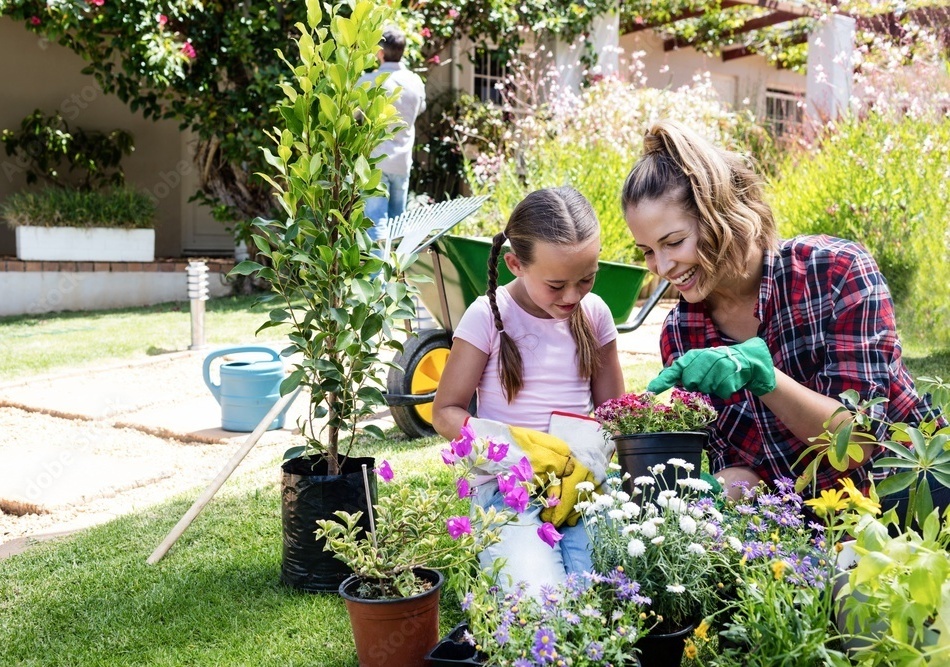

ВАРИАНТ 10
Task 1. Imagine that you are preparing a project with your friend. You have found some interesting material for the presentation and you want to read this text to your friend. You have 1.5 minutes to read the text silently, then be ready to read it out aloud. You will not have more than 1.5 minutes to read it.
As a rule, teenagers make a clear distinction between long-term friendships that they really treasure and acquaintances. If they have been friends since primary school, for example, they spend plenty of time together IRL – "in real life". It’s not a surprise as they have the same ideas and even hobbies. Such teenagers have mutual friends and they tend to get together, to share their interests and to have fun. And maybe they will follow a similar path into adulthood because close friends appreciate their regular face-to-face communication and rarely challenge each other. Long-term friendships are about talking to each other, texting, meeting, sharing their personal problems and happy moments ocassionally.
Teenagers have lots of acquaintances as well, but their communication can’t be called close. They know little about the person life of each other. Online chats, emails and Zoom calls are preferable for this kind of relationship based on common interests.
And in both cases the magic of communication leads to a healthy relationship among people.
As a rule, teenagers make a clear distinction between long-term friendships that they really treasure and acquaintances. If they have been friends since primary school, for example, they spend plenty of time together IRL – "in real life". It’s not a surprise as they have the same ideas and even hobbies. Such teenagers have mutual friends and they tend to get together, to share their interests and to have fun. And maybe they will follow a similar path into adulthood because close friends appreciate their regular face-to-face communication and rarely challenge each other. Long-term friendships are about talking to each other, texting, meeting, sharing their personal problems and happy moments ocassionally.
Teenagers have lots of acquaintances as well, but their communication can’t be called close. They know little about the person life of each other. Online chats, emails and Zoom calls are preferable for this kind of relationship based on common interests.
And in both cases the magic of communication leads to a healthy relationship among people.
Task 2. Study the advertisement.
You are considering attending the lecture “Effective communication among friends” in Moscow and now you’d like to get more information. In 1.5 minutes you are to ask four direct questions to find out about the following:
1. place
2. ticket price
3. registration
4. duration of the lecture
You have 20 seconds to ask each question.
You are considering attending the lecture “Effective communication among friends” in Moscow and now you’d like to get more information. In 1.5 minutes you are to ask four direct questions to find out about the following:
1. place
2. ticket price
3. registration
4. duration of the lecture
You have 20 seconds to ask each question.

Task 3. You are going to give an interview. You have to answer five questions. Give full answers to the questions (2–3 sentences). Remember that you have 40 seconds to answer each question.
Tapescript for Task 3
Interviewer: Hello everybody! It’s Teenagers Round the World Channel. Our guest today is a teenager from Russia and we are going to discuss communication among friends and acquaintances. We’d like to know our guest’s point of view on this issue. Please answer five questions. So, let’s get started.
Interviewer: What means of communication do you know?
Student: _________________________
Interviewer: What differences are there between communication among friends and communication among acquaintances?
Student: _________________________
Interviewer: What are the dominant principles of effective communication among friends?
Student: _________________________
Interviewer: Why do people find digital communication less challenging?
Student: _________________________
Interviewer: What means of communication do you prefer when you want to establish a relationship with your friends?
Student: _________________________
Interviewer: Thank you very much for your interview.
Interviewer: Hello everybody! It’s Teenagers Round the World Channel. Our guest today is a teenager from Russia and we are going to discuss communication among friends and acquaintances. We’d like to know our guest’s point of view on this issue. Please answer five questions. So, let’s get started.
Interviewer: What means of communication do you know?
Student: _________________________
Interviewer: What differences are there between communication among friends and communication among acquaintances?
Student: _________________________
Interviewer: What are the dominant principles of effective communication among friends?
Student: _________________________
Interviewer: Why do people find digital communication less challenging?
Student: _________________________
Interviewer: What means of communication do you prefer when you want to establish a relationship with your friends?
Student: _________________________
Interviewer: Thank you very much for your interview.
Task 4. Imagine that you and your friend are doing a school project "Communication among friends and acquaintances".You have found some photos to illustrate it but for technical reasons you cannot send them now. Leave a voice message to your friend explaining your choice of the photos and sharing some ideas about the project. In 2.5 minutes be ready to:
• explain the choice of the illustrations for the project by briefly describing them and noting the differences;
• mention the advantages (1–2) of the two types of communication;
• mention the disadvantages (1–2) of the two types of communication;
• express your opinion on the subject of the project – which type of communication you prefer and why.
You will speak for not more than 3 minutes (12–15 sentences). You have to talk continuously.
• explain the choice of the illustrations for the project by briefly describing them and noting the differences;
• mention the advantages (1–2) of the two types of communication;
• mention the disadvantages (1–2) of the two types of communication;
• express your opinion on the subject of the project – which type of communication you prefer and why.
You will speak for not more than 3 minutes (12–15 sentences). You have to talk continuously.


ВАРИАНТ 11
Task 1. Imagine that you are preparing a project with your friend. You have found some interesting material for the presentation and you want to read this text to your friend. You have 1.5 minutes to read the text silently, then be ready to read it out aloud. You will not have more than 1.5 minutes to read it.
Nowadays our friends can send messages via every available medium – text message, messaging app and email. Social media and messaging apps usually keep us more connected to each other. It’s extremely convenient to message your friends on any platform you like and to get feedback.
However, we sometimes get flooded via all these platforms. If you don’t like it, you can tell your friends, who you consider to be over-communicators, about your desire politely without saying rude phrases such as “back off” or ignoring your online pals. Try to discuss what messaging service should be used and how often. It’s much better that to have hundreds of unread messages and unopened emails from your pals.
Undoubtedly, for such talkative people the person, who doesn’t want to be in touch every two days, looks like the freak. And maybe you’re an odd person, but you’re the person who knows that chatting all the time is not an obligation, but an option. You realize that you have boundaries around communication online and ask people to respect them.
Nowadays our friends can send messages via every available medium – text message, messaging app and email. Social media and messaging apps usually keep us more connected to each other. It’s extremely convenient to message your friends on any platform you like and to get feedback.
However, we sometimes get flooded via all these platforms. If you don’t like it, you can tell your friends, who you consider to be over-communicators, about your desire politely without saying rude phrases such as “back off” or ignoring your online pals. Try to discuss what messaging service should be used and how often. It’s much better that to have hundreds of unread messages and unopened emails from your pals.
Undoubtedly, for such talkative people the person, who doesn’t want to be in touch every two days, looks like the freak. And maybe you’re an odd person, but you’re the person who knows that chatting all the time is not an obligation, but an option. You realize that you have boundaries around communication online and ask people to respect them.
Task 2. Study the advertisement.
You are considering using a new messaging app called “2day” and now you’d like to get more information. In 1.5 minutes you are to ask four direct questions to find out about the following:
1. the number of users
2. what languages it supports
3. main features
4. if it has a privacy policy
You have 20 seconds to ask each question.
You are considering using a new messaging app called “2day” and now you’d like to get more information. In 1.5 minutes you are to ask four direct questions to find out about the following:
1. the number of users
2. what languages it supports
3. main features
4. if it has a privacy policy
You have 20 seconds to ask each question.

Task 3. You are going to give an interview. You have to answer five questions. Give full answers to the questions (2–3 sentences). Remember that you have 40 seconds to answer each question.
Tapescript for Task 3
Interviewer: Hello everybody! It’s Teenagers Round the World Channel. Our guest today is a teenager from Russia and we are going to discuss different types of sending messages used by friends. We’d like to know our guest’s point of view on this issue. Please answer five questions. So, let’s get started.
Interviewer: What types of messaging do you know?
Student: _________________________
Interviewer: What are the most popular types of messaging among friends in the region where you live?
Student: _________________________
Interviewer: Is it important to know the basic texting etiquette? What rules should you follow when you text your friends?
Student: _________________________
Interviewer: What is better – to send texts or voice messages to friends? Why?
Student: _________________________
Interviewer: What are the disadvantages of messages?
Student: _________________________
Interviewer: Thank you very much for your interview.
Interviewer: Hello everybody! It’s Teenagers Round the World Channel. Our guest today is a teenager from Russia and we are going to discuss different types of sending messages used by friends. We’d like to know our guest’s point of view on this issue. Please answer five questions. So, let’s get started.
Interviewer: What types of messaging do you know?
Student: _________________________
Interviewer: What are the most popular types of messaging among friends in the region where you live?
Student: _________________________
Interviewer: Is it important to know the basic texting etiquette? What rules should you follow when you text your friends?
Student: _________________________
Interviewer: What is better – to send texts or voice messages to friends? Why?
Student: _________________________
Interviewer: What are the disadvantages of messages?
Student: _________________________
Interviewer: Thank you very much for your interview.
Task 4. Imagine that you and your friend are doing a school project “Different types of messaging». You have found some photos to illustrate it but for technical reasons you cannot send them now. Leave a voice message to your friend explaining your choice of the photos and sharing some ideas about the project. In 2.5 minutes be ready to:
• explain the choice of the illustrations for the project by briefly describing them and noting the differences;
• mention the advantages (1–2) of the two types of messaging;
• mention the disadvantages (1–2) of the two types of messaging;
• express your opinion on the subject of the project – which type of messaging you prefer and why.
You will speak for not more than 3 minutes (12–15 sentences). You have to talk continuously.
• explain the choice of the illustrations for the project by briefly describing them and noting the differences;
• mention the advantages (1–2) of the two types of messaging;
• mention the disadvantages (1–2) of the two types of messaging;
• express your opinion on the subject of the project – which type of messaging you prefer and why.
You will speak for not more than 3 minutes (12–15 sentences). You have to talk continuously.
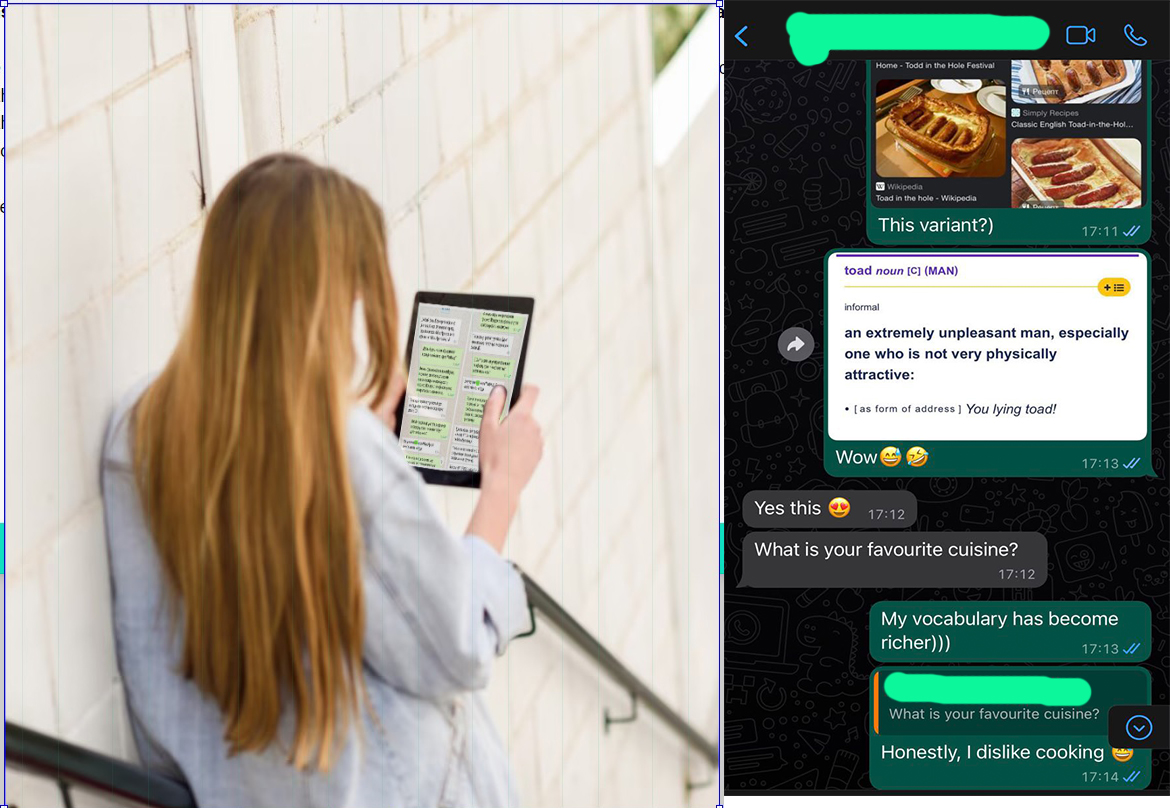

ВАРИАНТ 12
Task 1. Imagine that you are preparing a project with your friend. You have found some interesting material for the presentation and you want to read this text to your friend. You have 1.5 minutes to read the text silently, then be ready to read it out aloud. You will not have more than 1.5 minutes to read it.
Building sustainable urban environments is a challenge nowadays. Everyone has their own definition of ‘a smart city’. Some people pay attention to basic things such as a reliable water supply, employment opportunities, shopping malls, schools, restaurants and cafes. They may sound elementary, but they’re vital for a smart city. Others think that broadband services and technology shouldn’t be ignored in hi-tech cities, as well as parks, green spots and landscaped walkways.
Now it is a trend to see smartness not in ‘physical infrastructure’, but in human interactions and creativity. It’s more about ‘smart citizens’ who create active communities and cooperate thanks to internet-based media. It means that governments should invest both in the latest technology and in people to smarten up urban infrastructure.
Undoubtedly, the world's population is urbanising and expanding faster than ever and it’s extremely important to launch diverse smartphone apps enabling citizens to file city complaints publicly. This measure can also help to build sustainable urban environments.
Building sustainable urban environments is a challenge nowadays. Everyone has their own definition of ‘a smart city’. Some people pay attention to basic things such as a reliable water supply, employment opportunities, shopping malls, schools, restaurants and cafes. They may sound elementary, but they’re vital for a smart city. Others think that broadband services and technology shouldn’t be ignored in hi-tech cities, as well as parks, green spots and landscaped walkways.
Now it is a trend to see smartness not in ‘physical infrastructure’, but in human interactions and creativity. It’s more about ‘smart citizens’ who create active communities and cooperate thanks to internet-based media. It means that governments should invest both in the latest technology and in people to smarten up urban infrastructure.
Undoubtedly, the world's population is urbanising and expanding faster than ever and it’s extremely important to launch diverse smartphone apps enabling citizens to file city complaints publicly. This measure can also help to build sustainable urban environments.
Task 2. Study the advertisement.
You are considering moving to London with the help of the Rental Agency and now you’d like to get more information. In 1.5 minutes you are to ask four direct questions to find out about the following:
1. diversity of services
2. best districts to live in
3. employment and study opportunities
4. if there are Russian communities there
You have 20 seconds to ask each question.
You are considering moving to London with the help of the Rental Agency and now you’d like to get more information. In 1.5 minutes you are to ask four direct questions to find out about the following:
1. diversity of services
2. best districts to live in
3. employment and study opportunities
4. if there are Russian communities there
You have 20 seconds to ask each question.

Tapescript for Task 3
Interviewer: Hello everybody! It’s Teenagers Round the World Channel. Our guest today is a teenager from Russia and we are going to discuss urbanization. We’d like to know our guest’s point of view on this issue. Please answer five questions. So, let’s get started.
Interviewer: What region of Russia do you live in? Is it an urban area?
Student: _________________________
Interviewer: What makes a good urban environment?
Student: _________________________
Interviewer: What are the major disadvantages of urbanization? What benefits of urbanization can you name?
Student: _________________________
Interviewer: How can citizens help their city become a smart one?
Student: _________________________
Interviewer: Would you like to live a city in 10 years? Why/why not.
Student: _________________________
Interviewer: Thank you very much for your interview.
Interviewer: Hello everybody! It’s Teenagers Round the World Channel. Our guest today is a teenager from Russia and we are going to discuss urbanization. We’d like to know our guest’s point of view on this issue. Please answer five questions. So, let’s get started.
Interviewer: What region of Russia do you live in? Is it an urban area?
Student: _________________________
Interviewer: What makes a good urban environment?
Student: _________________________
Interviewer: What are the major disadvantages of urbanization? What benefits of urbanization can you name?
Student: _________________________
Interviewer: How can citizens help their city become a smart one?
Student: _________________________
Interviewer: Would you like to live a city in 10 years? Why/why not.
Student: _________________________
Interviewer: Thank you very much for your interview.
Task 4. Imagine that you and your friend are doing a school project “Urban challenges”. You have found some photos to illustrate it but for technical reasons you cannot send them now. Leave a voice message to your friend explaining your choice of the photos and sharing some ideas about the project. In 2.5 minutes be ready to:
• explain the choice of the illustrations for the project by briefly describing them and noting the differences;
• mention the advantages (1–2) of the two situations;
• mention the disadvantages (1–2) of the two situations;
• express your opinion on the subject of the project – which type of challenge you find more serious and why.
You will speak for not more than 3 minutes (12–15 sentences). You have to talk continuously.
• explain the choice of the illustrations for the project by briefly describing them and noting the differences;
• mention the advantages (1–2) of the two situations;
• mention the disadvantages (1–2) of the two situations;
• express your opinion on the subject of the project – which type of challenge you find more serious and why.
You will speak for not more than 3 minutes (12–15 sentences). You have to talk continuously.


